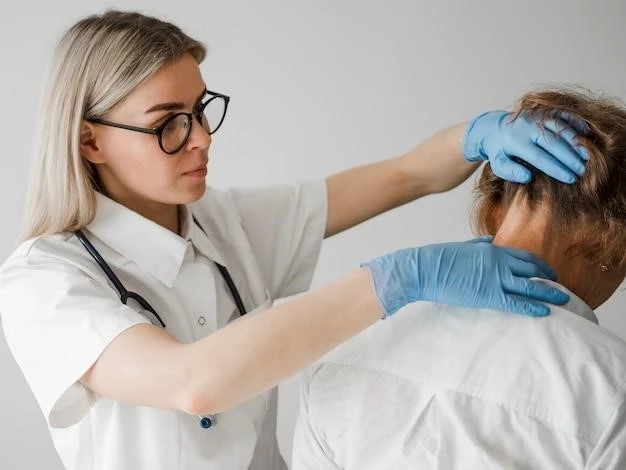Understanding Alopecia Immunodeficiency
Causes of Alopecia Immunodeficiency
Alopecia immunodeficiency can be caused by a combination of genetic factors‚ autoimmune reactions‚ and environmental triggers. Genetic predisposition plays a significant role‚ with certain genes influencing the risk of developing the condition. Autoimmune processes where the immune system attacks hair follicles can lead to hair loss in alopecia immunodeficiency. Environmental triggers such as stress‚ infections‚ or exposure to toxins may also contribute to the onset of the condition. Additionally‚ hormonal imbalances and nutritional deficiencies can play a role in the development of alopecia immunodeficiency. Understanding these underlying causes is crucial in managing and treating the condition effectively.
Symptoms and Diagnosis of Alopecia Immunodeficiency

Individuals with alopecia immunodeficiency may experience sudden hair loss‚ typically in round patches on the scalp or other parts of the body. Hair loss may progress rapidly or occur in cycles of remission and relapse. In some cases‚ there may be associated itching or burning sensation on the affected areas. Diagnosis of alopecia immunodeficiency involves a thorough medical history‚ physical examination‚ and sometimes scalp biopsies to confirm the condition. Dermatologists or immunologists may conduct blood tests to rule out underlying autoimmune disorders or to assess immune function. Trichoscopy‚ a specialized technique for evaluating hair and scalp conditions‚ can aid in the diagnosis of alopecia immunodeficiency by examining hair follicles closely. Early detection and accurate diagnosis are essential for appropriate management and treatment planning.
Treatment Options for Alopecia Immunodeficiency
Treatment for alopecia immunodeficiency aims to stimulate hair regrowth and manage the underlying immune dysregulation. Common approaches include topical treatments such as minoxidil to promote hair growth‚ corticosteroid injections to reduce inflammation in the affected areas‚ and immunomodulatory therapies to modulate the immune response. In some cases‚ immunosuppressants may be prescribed to suppress the autoimmune reaction responsible for hair loss. Laser therapy and platelet-rich plasma (PRP) injections are emerging treatment modalities that show promise in improving hair regrowth. Hair transplantation may be considered for individuals with extensive hair loss. Complementary therapies like acupuncture or dietary supplements are also explored for their potential benefits in managing alopecia immunodeficiency. Treatment plans are tailored to individual needs and may involve a multidisciplinary approach with dermatologists‚ immunologists‚ and other specialists collaborating to achieve optimal outcomes.
Research Advances in Alopecia Immunodeficiency
Ongoing research in alopecia immunodeficiency is focused on understanding the complex interplay between genetic‚ immune‚ and environmental factors contributing to the condition. Advances in genomics have identified specific gene variants associated with alopecia immunodeficiency‚ shedding light on the genetic basis of the disease. Immunological studies aim to elucidate the mechanisms underlying autoimmune reactions targeting hair follicles and explore novel immunotherapy approaches to restore immune tolerance. Emerging technologies such as high-resolution imaging techniques and proteomic analyses offer new insights into the pathogenesis of alopecia immunodeficiency at a molecular level. Clinical trials testing innovative treatment modalities‚ including stem cell therapies and gene editing techniques‚ are paving the way for more personalized and effective interventions. Collaborative efforts between researchers‚ clinicians‚ and industry partners are driving advancements in the field‚ with the ultimate goal of developing targeted therapies for alopecia immunodeficiency.
Alopecia Immunodeficiency in Children
Alopecia immunodeficiency in children presents unique challenges due to their developing immune systems and psychosocial considerations. The condition can manifest differently in children compared to adults‚ with cases of sudden hair loss or atypical patterns requiring specialized care. Diagnosis in pediatric patients often involves collaboration between dermatologists‚ pediatricians‚ and immunologists to ensure comprehensive evaluation and appropriate management. Treatment options for children with alopecia immunodeficiency may include topical therapies‚ corticosteroid solutions‚ or phototherapy‚ with careful consideration of potential side effects and long-term impact on growth and development. Psychosocial support and counseling are crucial for children and their families to cope with the emotional impact of hair loss. Educational interventions in schools can help address bullying or social challenges that children with alopecia immunodeficiency may face. Monitoring growth‚ development‚ and immune function in pediatric patients is essential for optimizing outcomes and ensuring holistic care.
Lifestyle Management with Alopecia Immunodeficiency
Effective lifestyle management plays a key role in supporting individuals with alopecia immunodeficiency to cope with the condition and optimize overall well-being. Maintaining a healthy and balanced diet rich in vitamins and minerals essential for hair health can help promote hair growth and overall immune function. Stress management techniques such as mindfulness‚ meditation‚ or yoga can be beneficial in reducing stress levels‚ which may trigger or exacerbate hair loss. Protecting the scalp from sun exposure and harsh chemicals‚ as well as using gentle hair care products‚ can help maintain scalp health and minimize further hair damage. Seeking support from support groups‚ counselors‚ or psychologists can provide emotional support and coping strategies for dealing with the psychosocial impact of alopecia immunodeficiency. Engaging in physical activities and hobbies can also boost self-esteem and confidence‚ empowering individuals to navigate the challenges associated with the condition.
Coping Strategies for Alopecia Immunodeficiency
Coping with alopecia immunodeficiency requires a multifaceted approach that addresses the physical‚ emotional‚ and social aspects of the condition. Developing a positive self-image and self-acceptance is essential in navigating the changes associated with hair loss. Building a support network with family‚ friends‚ or support groups can provide emotional support and a sense of belonging. Engaging in activities that boost self-confidence and self-esteem‚ such as pursuing hobbies or exercise‚ can help individuals feel empowered and resilient. Exploring different styling options‚ such as wigs‚ scarves‚ or hats‚ can provide a sense of control over one’s appearance and enhance self-confidence. Seeking professional counseling or therapy can offer coping strategies to manage stress‚ anxiety‚ or depression that may arise from dealing with alopecia immunodeficiency. Embracing individuality and focusing on inner qualities and strengths can foster a positive mindset and facilitate adaptation to living with the condition.
Future Perspectives in Alopecia Immunodeficiency Research
The future of alopecia immunodeficiency research holds promise for innovative advancements in understanding the underlying mechanisms of the condition and developing targeted therapies. Genomic studies exploring the genetic basis of alopecia immunodeficiency may lead to personalized treatment approaches based on individual genetic profiles. Advancements in immunotherapy techniques‚ including biologics and immune checkpoint inhibitors‚ are being investigated to modulate immune responses and restore hair growth in individuals with alopecia immunodeficiency. Stem cell research offers potential regenerative therapies to stimulate hair follicle regeneration and hair growth. The application of artificial intelligence and machine learning in analyzing large datasets may uncover novel insights into disease pathways and facilitate the discovery of new therapeutic targets. Collaborations between academia‚ pharmaceutical companies‚ and healthcare providers are vital in driving translational research to improve outcomes for individuals with alopecia immunodeficiency. Continued research efforts are essential in shaping the future landscape of diagnosis‚ treatment‚ and management of this complex condition.
